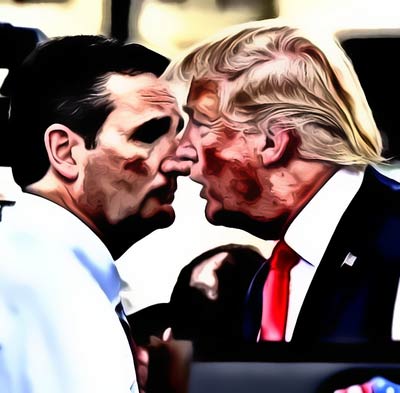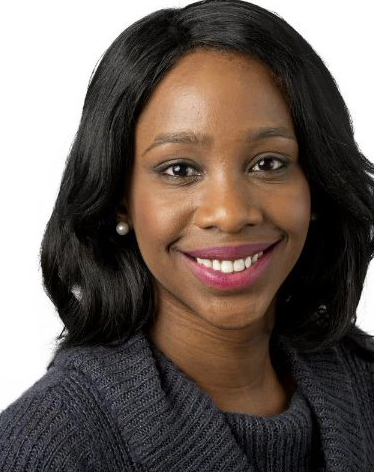
MANCHESTER, N.H. - As the first primary contests rapidly approach, a rash of bickering has broken out among several Republican presidential candidates, marking the beginning of a new, more serious phase of the race.
With just 60 days until the Iowa caucuses and then the New Hampshire primary, the sparring reflects an urgent push among the second- and third-tier GOP candidates to become the main alternative to resilient front-runner Donald Trump.
From immigration to government surveillance, guns and terrorism, the rivals are increasingly willing to draw distinctions - and call each other by name - as they move to secure the loyalty of early-state voters just starting to pay attention to the race.
The feuding is particularly notable among New Jersey Gov. Chris Christie and Sens. Ted Cruz and Marco Rubio, who have shown signs of strength in recent weeks and are attempting to carve out distinct identities within the party.
Christie, who campaigned here Tuesday, pitches himself as a seasoned executive and former prosecutor with more experience than the two rookie senators. "I'm talking about anybody who doesn't have the requisite experience to make the tough decisions they need to be president," he said Tuesday on MSNBC's "Morning Joe," adding that Rubio, Cruz and others "have no experience in governing."
Christie's comments come as Rubio and Cruz are engaged in an increasingly bitter back-and-forth over immigration, surveillance issues and national security - sparring that has become more intense in the wake of last month's terrorist attacks in Paris.
Rubio (Florida), positioning himself as one of the most hawkish candidates in the GOP field, has taken aim at Cruz's support for legislation halting the mass collection of telephone records by the National Security Agency.
"There are Republicans, including Senator Cruz, that have voted to weaken those programs," Rubio said Monday on Fox News. "That is just part of the record, it is nothing personal."
Cruz (Texas) fired back by linking Rubio to the foreign policy of Hillary Clinton, the former secretary of state and Democratic front-runner. "Senator Rubio emphatically supported Hillary Clinton in toppling [Moammar] Gaddafi in Libya. I think that made no sense," Cruz said in an interview with Bloomberg Politics, decrying what he called "military adventurism" gone awry.
Christie, who emphasizes his experience as a U.S. attorney after the 9/11 attacks, dove into the Cruz and Rubio dispute by saying that Cruz and Sen. Rand Paul (Kentucky), another GOP candidate, made the country less safe with their votes to limit the NSA surveillance program.
"I didn't get briefed in some basement on Capitol Hill," Christie said. "I understood based on my experience as a U.S. attorney that this is necessary to protect the homeland."
The change in tone from several candidates underscores the difficulties they have had distinguishing themselves from the pack as Trump and retired neurosurgeon Ben Carson have dominated the polls.
"Part of it is the large primary field that has created voter uncertainty in New Hampshire," said Wayne MacDonald, chairman of Christie's campaign in the state. "Citizens take their responsibility seriously here. They want to see the candidates, in many cases, or in some cases more than once. So that's been part of the problem."
The fight between Cruz and Rubio - both Cuban American freshman senators elected amid tea party waves - has simmered for weeks, boiling over in recent days.
Cruz has accused Rubio of supporting "massive amnesty" as a co-sponsor of an ill-fated bipartisan Senate immigration bill, while Rubio has singled out Cruz's surveillance vote. Rubio and his backers believe that he can draw a clear distinction with Cruz on national security; a recent ad from a pro-Rubio group said Cruz was weak on security issues - an allegation called "despicable" in a Cruz response ad.
At a campaign rally in Guntersville, Alabama, on Tuesday afternoon, where Rubio's campaign estimated an attendance of more than 750 people, the senator from Florida never mentioned Cruz by name. But Rubio took a veiled shot at him during a lengthy warning about the threat posed by Islamic State terrorists.
"We have to have the ability to know more about them than they ever know about us," he told the crowd gathered on a rec center basketball court. "And that's why we have to have strong intelligence programs. It is unacceptable that today, because of disclosures and because of changes to the law, supported sometimes by Republicans themselves, we have lost the ability to find these people before they find us."
Left largely out of the intraparty fray for now is former Florida governor Jeb Bush, who spends much of his time criticizing Clinton and President Obama rather than his GOP rivals. Campaigning in Waterloo, Iowa, on Tuesday, Bush dodged when asked whether Christie's record on gun rights was sufficiently conservative.
"I think I have probably the best Second Amendment record of any person running," he said, adding: "I'm going to focus on my record. I believe I'm going to win New Hampshire, to be honest with you. I honestly believe it."
As for Trump, many of the candidates are dismissing his chances once voting begins. Cruz said this week that he doubts Trump will be the party's nominee; in a new Cruz ad featuring Medal of Honor recipients, one says that "this is no reality show" - a clear jab at Trump's long career as host of "The Apprentice."
Throughout much of the campaign, Trump has been the candidate most eager to lob insults at his Republican opponents, usually in biting and personal ways. Tuesday, he made his oft-repeated dig that Bush "doesn't have energy," and he questioned the temperament of Ohio Gov. John Kasich, whose campaign and super PAC have directly attacked him.
"This guy Kasich, he's like a lunatic," Trump said on SiriusXM. "You watch him on the stage, he can't debate, he can't talk."
For the candidates, responding to Trump rarely pays dividends. When Christie was asked last week about Trump's widely debunked claim that "thousands" of Muslims in New Jersey were seen celebrating in the streets after 9/11, he replied that he didn't recall that, but added, "You know, there could be things I forget, too."
He answered a similar question more forcefully Monday, apparently moving to neutralize Trump and the issue. He told reporters flatly that such mass celebrations "didn't happen" and that Trump - who had called his initial response "weak" - was trying to intimidate him.
"I was there on 9/11. I wasn't across the river in New York City. I was there," Christie said in New Hampshire. "It didn't happen."
"The worst part about his claim is that he said he saw it on television," Christie added. "No one has been able to unearth any video of any such thing happening."
For his part, Trump noted this week that he has been monitoring the back-and-forth between his rivals closely.
"I've been watching this little debate between Rubio and Cruz, and I loved it because I haven't been so involved," Trump said on MSNBC. "It's the one thing I haven't been involved. Can you believe it?
"And they seem to be attacking themselves very strongly because somebody wants to be standing to challenge me," he said.



 Contact The Editor
Contact The Editor
 Articles By This Author
Articles By This Author